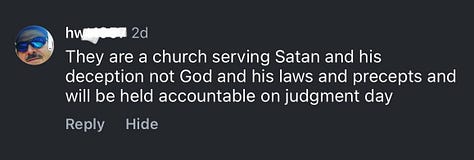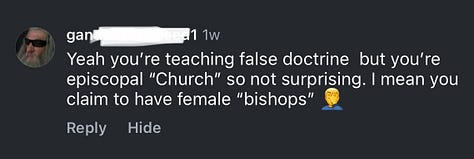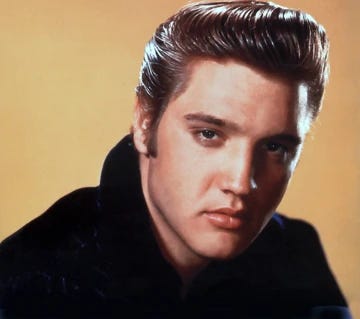To listen to this week’s reflection, use the link above. Want to contribute to Aloha Friday with Fr. Tim? Consider upgrading to a paid subscription. Thanks for reading (or listening)!
I’m going to say something that is not going to be surprising to about half of the people reading this: men can be real jerks. What? But Fr. Tim! You’re a man! How can you say something like that and generalize an entire group of people? You’re right. I am a man. And, very likely, I have been a real jerk at times. I try not to be, but I’m learning it’s something that society just teaches us. Boys have all kinds of messages thrown in our faces from the time we’re infants, and many of those messages stick. Toys marketed toward boys are often aggressive in nature. I had toy guns, swords, army men, Teenage Mutant Ninja Turtles, He-Man, and more when I was a kid. And my mom didn’t even let me have some of the more aggressive toys that other boys had. There isn’t anything inherently wrong with these toys, by the way. They’re inanimate objects. But it’s how society encourages boys to play with them that can become potentially problematic. Is it problematic to be a man? No. Can men become jerks and not even realize it? Yes.
I’m a male, I grew up around other males, I’ve participated in “male behaviors” like name calling and such in my lifetime, and I’ve been the target of similar “male behaviors.” And in many ways, I’ve been complicit. In fact, simply by my very identity as a man in American society, I am complicit. It would be wrong to say I’m surprised that men can be jerks. But I can say I’m surprised at exactly how big of jerks some men can be.

When I studied at Notre Dame, I took a class that was offered as a joint effort between the theology school and the business school. It was a course entitled Evangelization Through Media. Because of what I learned in this class, I developed a hypothesis that social media could be a helpful tool to bring awareness to churches. I attribute this to Ariel, the Little Mermaid, who sang, “I wanna be where the people are.” A church can be doing all sorts of great things, but if no one knows about it, they won’t be able to celebrate it. The people are on social media! So, within the past few years, I slowly began to enhance our church’s (and mine!) social media visibility. I started with some more frequent posts on Facebook, highlighting what was going on in the Church. I eventually started adding more photos, and started an Instagram account, because photos get more traction. I created “events” and sent out invitations for special services. I encouraged people to “like, share, and comment” everything they see on our social media platforms to enhance the algorithm. It slowly gained us a few more followers (and even some visitors! Yay!). After Bishop Mariann Budde preached at the her cathedral with President Donald Trump in attendance, and got lots of eyes on the Episcopal Church, I decided to crank my social medial presence into full gear. I decided to experiment with videos in the reels section, which is Instagram’s and Facebook’s feature intended to compete with TikTok. I started with theology lessons, but those seemed to go nowhere. Then I tried a different tactic. Silliness. Essentially, I made parody videos of “trends”. When I started doing this, our following took off! Then, when I got people’s attention with silly videos, I could hold their attention with theology videos. My viewership increased, and I even had one video go “viral” (in Instagram speak, a viral video is one that has over 10,000 views). Now, to be honest, when I made this viral video, I realized I had cracked a code of sorts. I knew the terms “Christian” and “LGBTQ affirming” didn’t frequently fit together, and I noticed a whole lot of young men (who usually have no formal theological training) like to comment on videos about these topics. In fact, these young men had already commented on many of my videos, calling me names like “heretic” or “false prophet” or “wolf” or other insults. I think my favorite to date is “Episcopalian cuckoo bird”. I knew comments would get me viewership, and viewership meant more eyes on the Church. So, I “poked the bear” a little by making a video implying that they shouldn’t bash vulnerable people, and that they are not qualified to call anyone “heretics” or “sinners” (because, of course, only God can do that). In the world of algorithms, comments increase playtime. Playtime increases viewership. Viewership attracts follows. Follows attract more visibility. And the whole process starts again. It’s a big spiral to get more visibility and more eyes on the Church. As this cycle continues, more and more and more people see the content. A week after posting it, my video has now accumulated nearly 30,000 views. It also has received over 1,000 comments. Most of these comments were made by men. Most of these comments are negative. And most of these comments are, quite frankly, cruel.






As I said, I know men. I am a man. I know how men behave. So, I’m not exactly surprised that men can be jerks. But exactly how big of jerks we can really be? Well. That one shocks me. As I said, I had “poked the bear”, so I knew it would get their attention. But the exact level of cruelty simply floored me. And the fact that it floored me is a problem. It’s a problem because, even when I try my best to advocate for people society has tried to place on the margins, I am blind to my own privilege.
When we hear the word privilege, it is easy for us to become defensive. This is especially true for people who look like me: large, white, straight males. Why? Well, because we don’t like to feel like someone is telling us we didn’t work hard, or that we didn’t earn everything we have. Problem is, that’s not what people are saying when they tell us we have privilege. They’re telling us that we didn’t have extra obstacles that prevented our hard work from paying off. Obstacles that were not in our control. Obstacles that society placed there. Obstacles we don’t know existed because we never were put in a position where we had to pay attention to them. Obstacles that we can, for the most part, be blissfully unaware of. With absolutely zero consequences.
I, for instance, knew that people make homophobic, racist, misogynistic, transphobic, antisemitic, and other hateful comments. But I didn’t know to what extent until I started increasing my social media presence. Hiding behind keyboards (and usually some kind of weird, cartoonish profile picture and some weirdly aggressive screen name), these people (who say they are men) say some of the most vile, cruel, ignorant, disgusting things you could imagine. And coming from my place of privilege, I never knew it was this bad. The troubling piece is, the people I try to support, the people who members of society try to place on the margins, did know. They do know. They’ve always known. They may have even tried to tell me. They may have, in fact, told me. And until I saw it myself, I never had a context where I had to deepen my understanding of their trials.
Every woman knows that sexism is real. There isn’t a woman reading this who has not been groped, belittled, ignored, hit on, harassed, or made to feel uncomfortable in some way at some point in her life. There isn’t a woman around who hasn’t tried to work harder than the men in the office just to achieve similar pay or promotions. There isn’t a woman reading this who doesn’t know that society just treats women differently than they treat men. And yet, she knows that far better than I ever will. Because she’s experienced it. I have not.
Every person of color in this country knows that racism is real. There isn’t a Black person reading this who hasn’t been frightened by the presence of the police (the police who are supposed to protect all of us) because of uncertainty of their intentions. There isn’t a Black person reading this who hasn’t been called names or treated differently for absolutely no reason other than the color of their skin. There isn’t a person of color reading this who hasn’t experienced some kind of profiling, or different treatment, for no reason other than appearance. And yet, they know it far better than I ever will. Because they’ve experienced it.
Every person in the LGBTQ+ community knows homophobia and transphobia are real. In fact, even within the LGBTQ+ community, there’s a “hierarchy” of these types of discrimination. Gay white men are at the top of this hierarchy. Trans women of color are at the bottom. Trans women of color are the most vulnerable people in our country. They are subject to abusive comments, conduct, rape, violence, and even death. And members of the LGBTQ+ community know this far better than I ever will.
Why do vulnerable people know these things better than I do? Because they live with them and I do not. It’s just that simple.
But the comments I receive on my social media posts are telling. Firstly, they’re disgusting. To the point where it makes me feel like I’ve made a big mistake. Why would I want to put myself through this… on purpose??? That seems like masochism! But here’s the thing. I’m not going to stop. And I’m not going to back down. Why not? Because I’m a firm believer that Jesus’s words to us in the 25th chapter of Matthew’s gospel are serious instructions. What are those instructions? They essentially tell us that if we’re in positions of power, we ought to look out for those who are vulnerable. The verbiage usually used in English is “the least of these.” But I don’t like the way that sounds, because it implies degrees of greater than or lesser than. Instead, what it means is those who have not been afforded as much dignity as others. As a straight, white, Christian man, society imposes a whole lot of dignity upon me. The same dignity that is not afforded by society to a Black trans woman. So, in essence, I am responsible to uphold her dignity. I am responsible to uphold the dignity of all those who have been afforded less dignity than me. I am responsible to demonstrate love, compassion, empathy, and care for people who do not shar my degree of privilege. And guess what? If you are a person of privilege, you are responsible for doing the same.
While I pledge to be cautious so as not to make my parish a target of violence, I also pledge to uphold my duty to speak for those whose voices are silenced by voices more similar to my own. Women. Immigrants. Black people. Brown people. LGBTQ+ persons. Children. The disabled. The sick. The imprisoned. The hungry. The homeless. Anyone who does not share my privilege. If you do not share my privilege, I promise to do my best to speak on your behalf if you find that your voice has been silenced. I promise to do my best to uphold and to honor your dignity. And if you are a person of privilege, I want to invite you to do the same.
Misogyny, racism, sexism, homophobia, transphobia, and all other forms of discrimination are sinful. Why? Because they harm the faithful. And, as Paul writes, together, we are the Body of Christ. When part of the body is injured, the whole body suffers. As I now have a better understanding of what that injury can look and feel like, I want to work toward a world where that kind of injury is a thing of the past. Something we read about in history books. Something our children will one day ask us about and we can respond with, “yeah, that stuff really happened, but I’m glad it doesn’t anymore.”
I’m going to continue to make content. Firstly, I find it enjoyable. It doesn’t take much time to record and splice a video together. It brings awareness to the Episcopal Church, and I hope it helps people to know who we are and how to find us. But secondly because I want to do my part to share the message to marginalized people that, even when society places them on the margins, someone has their back. Those negative comments? I could take them down. But I haven’t. Why? Because my responses to them are not for those who make them. They’re not for those who “like” them. They’re not for me. No. They’re for the people who see them silently, but can’t “out” themselves by commenting or by liking. The people who need to know that someone who looks like me is standing up for their dignity. The people who need a voice because their voices have been unfairly silenced.
In closing, it’s imperative that we all do our best to listen to the stories of those in our lives who are willing to share them. If someone says they have been injured, we must take their word seriously. If someone allows themselves to be vulnerable enough to tell us that we have injured them, we must refrain from becoming defensive, and instead, hear them out. It doesn’t have to be this way. People don’t have to be cruel. People don’t have to say mean things. People don’t have to be jerks. Men don’t have to be jerks. What should men do? We should look out for those who don’t share our privilege. We should be present with people. We should model kindness and care and compassion and even (gasp!) empathy. Contrary to what a certain deacon in my previous town of Ogden, Utah, recently said, there is no “sin of empathy.” There is, however, a sin of lack of empathy. As Christians, let’s refrain from committing that sin. Let’s refrain from complicity in sin. Let’s do our best, as Jesus instructed us in Matthew’s gospel, to take care of those who truly need our help.







Your insight as a man is truly humbling and thank you for putting yourself out there. Hopefully others will do some deep reflecting and start to change.
You hit the mark. Again. Your words make a difference. Thank you.